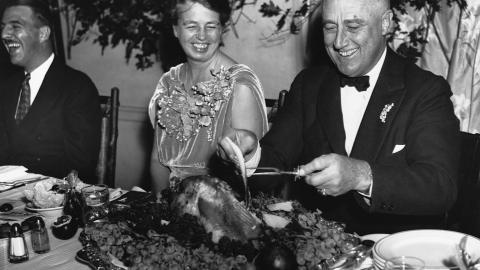Americans have celebrated Thanksgiving for more than 400 years, beginning in 1621 when the Pilgrims and Wampanoag came together for their famous feast. It wasn’t until 1941, however, that the holiday’s date was codified in law, when Franklin Roosevelt signed a joint resolution of Congress mandating its celebration on the fourth Thursday of November.
It was FDR’s ill-considered decision three years earlier to move the date—then observed on the last Thursday of November—that sparked Congress’s action. The president’s change had caused a national uproar, such that residents of half the states ate their turkey dinners on what they considered to be the traditional date, while those in the other half did so on “Franksgiving,” the date newly ordered by the president. The residents of Texas, Colorado and Mississippi, apparently having a special affection for turkey dinners, celebrated on both dates.
This wasn’t the first time public opinion exploded over when Thanksgiving should occur. In 1687 New Englanders slammed a colonial governor who took it upon himself to decree the date of the holiday. It was an early example of Americans’ resentment of English tyranny, presaging the anger that would erupt into the Revolutionary War in the next century.
Sir Edmond Andros, royal governor of the Dominion of New England, usually ruled from his seat in Boston, but on a visit to Connecticut in the autumn of 1687 he discovered local authorities had appointed Nov. 3 as a day of public thanksgiving. Andros immediately sought to annul the move on grounds that only he had the authority to name a thanksgiving day. But the annulment came too late to prevent observance of the holiday in most of Connecticut.
Meanwhile, ministers of churches in Massachusetts met during Andros’s absence and named Nov. 17 as Thanksgiving. Andros returned to Boston on Nov. 16 and revoked the ministers’ proclamation. Selecting a Thanksgiving day was a royal prerogative, he declared, accorded solely to him as the representative of the Catholic King James II. Andros named Dec. 1 as Thanksgiving Day for all New England.
Most New Englanders reluctantly cooperated with the governor’s decree. They stayed home—it was illegal to work on Thanksgiving—and went to church, where their prayers of gratitude presumably didn’t extend to the royal governor.
The exception was the people of Rhode Island, who refused to allow an Englishman to tell them when to give thanks. In defiance of the governor’s proclamation, Rhode Islanders went to work on Dec. 1 and declined to attend religious services.
Andros eventually got his comeuppance. The Glorious Revolution in England the following year resulted in two Protestant sovereigns elevated to the throne. New Englanders threw Andros into jail, sent him back to England and had the pleasure of proclaiming days of thanksgiving for the ascension of William and Mary.

















